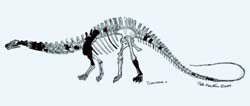Up to 20 million homes in Europe could be powered by clean renewable energy from the sea, according to ocean energy expert Teresa Pontes of Portugal, who was speaking at the EurOCEAN marine science and policy event in Galway today (12th May). She estimated that, by harnessing energy from waves and marine currents, Europe would produce around 200 TerraWatt (200 million megawatt) hours per year of electrical power.
“The oceans contain a huge energy resource with different origins,” said Ms. Te
’Hyperactive’ antifreeze protein has eluded researchers for more than 30 years
A surprising discovery by Queen’s researchers helps explain why fish swimming in icy sea water don’t freeze.
The team, led by Biochemistry Professor Peter Davies, has identified a new “antifreeze” protein found in the blood of winter flounder enabling the fish to withstand temperatures as low as -1.9 degrees Celsius: the freezing point of sea water. The antifreeze plasma protei

Through the cycads and gingkoes of the floodplains, not far from the Sundance Sea, strode the 50-foot-long Suuwassea, a plant-eating dinosaur with a whip-like tail and an anomalous second hole in its skull destined to puzzle paleontologists in 150 million years. According to researchers at the University of Pennsylvania, Suuwassea emilieae (pronounced SOO-oo-WAH-see-uh eh-MEE-LEE-aye) is a smaller relative of Diplodocus and Apatosaurus and is the first named sauropod dinosaur from the Jurassic of s
Scientists will soon be extracting the deepest Arctic sedimentary cores ever drilled from the Lomonosov Ridge, in the deep oceans more than 2,000 km off the coast of Norway. They will core to a depth of about 500 metres under the seabed. From studying these cores the researchers expect to answer questions such as ’what caused the ice-age?’ So far the deepest oceanic sediment core extracted from the Arctic is only from a depth of 16 metres.
Seafloor sediments conceal a rich history
Future potential for the production of new wonder drugs – including anti-cancer agents – from marine animals and plants, is under threat according to biodiversity expert Professor Carlo Heip, speaking at the European marine science and ocean technology conference EurOCEAN 2004 in Galway, today.
According to Professor Heip, marine biodiversity – the richness of life in the sea – is being undermined by overfishing, pollution, the introduction of exotic or alien species from other countries, by
Seas and oceans are a vital resource for Europe and the world, particularly in terms of fishing and extracting minerals. But our oceans are now under intense pressure from over-exploitation and more than ever need to be managed in a sustainable way. To help ensure the protection and sustainable use of marine resources, 500 leading scientists, policy makers and other stakeholders will meet today, and for three days, at the EUROCEAN2004 conference in Galway (Ireland). The Commission will present lates